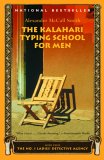Reading Guide Questions

Please be aware that this discussion guide will contain spoilers!
- What themes and situations recur throughout the Precious Ramotswe novels? In what ways are the books similar? What new characters and developments keep the stories fresh?
- Mma Ramotswe observes, "The trouble with men, of course, was that they went about with their eyes half closed for much of the time. Sometimes Mma Ramotswe wondered whether men actually wanted to see anything, or whether they decided that they would notice only the things that interested them" [p. 17]. Is this an accurate assessment? What other statements about the differences between men and women occur in The Kalahari Typing School for Men? What perception about male psychology allows Mma Makutsi to open the typing school?
- What prompts Mr. Molefelo to seek out Mma Ramotswe's help? In what ways is his request different from what most people would ask of a private detective?
- In considering the changing morality of modern times, Mma Ramotswe suggests that people are now "far too ready to abandon their husbands and wives because they had tired of them. . . . And friends, too. They could become very demanding, but all you had to do was to walk out. Where had all this come from, she wondered. It was not African, she thought, and it certainly had nothing to do with the old Botswana morality. So it must have come from somewhere else" [p. 107]. Where might such changes in attitude have come from? What are the consequences of this weakened sense of loyalty, in the novel particularly, and in society more generally?
- How does Mma Ramotswe respond to Motholeli's unhappiness? Why is she able to sympathize with the orphan girl's pain so strongly? What important message does Mma Ramotswe give her?
- Discussing the relationship between education and experience, Mma Potokwani says that "You don't have to read a book to understand how the world works. . . . You just have to keep your eyes open." Mma Ramotswe agrees but feels a "great respect for books. . . . One could never read enough. Never" [p. 130]. How does Mma Ramotswe herself embody a balance between knowledge gained from direct experience of life and knowledge gained from books?
- Why does Mr. Cephas Buthelezi, the arrogant detective who tries to usurp Mma Ramotswe, decide to quit? Why do all his experience, training, and travels fail to serve him in Botswana? What does he lack that Mma Ramotswe has in abundance?
- As Mma Ramotswe confronts Mr. Sleleipeng about his behavior toward Mma Makutsi, she refrains from lecturing him. "I could never be a judge, she thought; I could not sit there and punish people after they have begun to feel sorry for what they have done" [p. 178]. Where else in the novel does she exhibit this ability to listen without judging? How does this ethos differ from the typical ways of dealing with the guilty in American detective fiction and American life more generally? Why is Mma Ramotswe able to feel such compassion even for those who have clearly hurt others?
- In place of violence and revenge, the Precious Ramotswe novels substitute understanding and forgiveness. How is Alexander McCall Smith able to make this reversal of values so satisfying, in both the literary and moral senses?
- Near the end of The Kalahari Typing School for Men, as the novel's various problems are being resolved, Mma Ramotswe observes, "It was astonishing how life had a way of working out, even when everything looked so complicated and unpromising" [p. 183]. Does the novel resolve its problems too easily? Or do these resolutions faithfully reflect the degree to which Mma Ramotswe, Mma Makutsi, Mr J.L.B. Maketoni, Mma Potokwani, and other characters live in harmony with their world?
- Mr. Buthelezi trumpets his "toughness" and police-force experience in dealing with serious criminals, along with his knowledge of how detective work is done in New York and other big cities. Is Alexander McCall Smith poking fun, through the character of Mr. Buthelezi, at the kind of detective who appears in more conventional mystery novels? Why is Mr. Buthelezi so ill suited to the needs of the people of Botswana?
- What is so appealing about the world in which Mma Ramotswe lives? In what ways is it different from contemporary American society? Are the values and attitudes of Mma Ramotswe translatable to North American soil?
Unless otherwise stated, this discussion guide is reprinted with the permission of Anchor Books.
Any page references refer to a USA edition of the book, usually the trade paperback version, and may vary in other editions.





